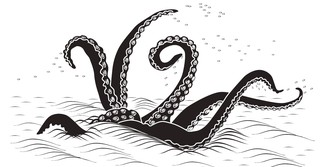Leviathan and Behemoth in the Bible: Real or Myth?
Share

The book of Job describes two creatures, Behemoth and Leviathan, that have intrigued many people who have made it to the end of Job. Just what are these creatures that God describes to Job? Are they real animals that were known to Job? Or were they mythological creatures? This article will examine some of the suggestions that have been made concerning these strange creatures in Job.
Behemoth in the Bible
All we know of Behemoth is found in Job 40. Behemoth was created by God and eats grass like an ox. But he is very powerful, with bones of bronze, limbs of iron and a tail like a cedar. It lives in the marshes and rivers and is unafraid of anything. It is the first among the works of God.
Behold, Behemoth, which I made as I made you; he eats grass like an ox. Behold, his strength in his loins, and his power in the muscles of his belly. He makes his tail stiff like a cedar; the sinews of his thighs are knit together. His bones are tubes of bronze, his limbs like bars of iron. "He is the first of the works of God; let him who made him bring near his sword! For the mountains yield food for him where all the wild beasts play. Under the lotus plants he lies, in the shelter of the reeds and in the marsh. For his shade the lotus trees cover him; the willows of the brook surround him. Behold, if the river is turbulent he is not frightened; he is confident though Jordan rushes against his mouth. Can one take him by his eyes, or pierce his nose with a snare? Job 40:15-24 ESV
Behemoth clearly resembles a hippopotamus. A hippo does not literally have bones and limbs of bronze and iron, but these may simply be a rhetorical expression to describe its power. The tail, like a cedar though, is challenging since a hippo’s tail is small. However, its identification as a hippo has been the most common view of behemoth through much of history.
In more recent years, with the discovery of dinosaurs, has come the thought that Behemoth described a dinosaur. Some are inclined to see them as existing with Job. And others as reconstructed from fossilized bones found in the region.
A third view of Behemoth is that it was a mythological creature. This view will be discussed later in this article.
Leviathan in the Bible
Leviathan is the second creature mentioned by God. The entire 41st chapter of Job is dedicated to this creature. A Leviathan is described as a fierce and untamable beast. It is covered with impenetrable armor and has a mouth full of deadly teeth. Leviathan breathes fire and smoke and churns up the sea like an ink pot. Nothing on earth is its equal.
Unlike Behemoth, Leviathan is mentioned elsewhere in the Scripture. Psalm 74:14 refers to the heads of Leviathan, implying a multiheaded beast. Psalm 104:26 describes Leviathan frolicking in the vast sea. And Isaiah 27:1 describes God slaying Leviathan, a coiling serpent and sea monster.
One other possible reference to Leviathan is in Genesis 1:21. The NIV starts this verse with God creating the great creatures of the sea. The word creatures is translated here as tannin. Bill Mounce defines this word as “serpent, snake; monster of the deep; can refer to large sea creatures as well as to mythological monsters of chaos opposed to God.” This word is used 15 times in the Old Testament and is often translated as a snake, but sometimes as a monster.
It is common to view Leviathan as a crocodile. But some aspects of this creature are hard to reconcile with a crocodile. A multi-headed, fire-breathing sea monster does not come close to the description of a crocodile.
Because of this, as in the case of Behemoth, it is common for many today to view Leviathan as a dinosaur or mythological creature rather than an actual animal found at the time of Job. Others, however, hold firmly to the view that Leviathan was actually known to Job and must have been a crocodile with exaggerated characteristics.
Leviathan Bible Verses
Let those curse it who curse the day, who are ready to rouse up Leviathan. ~ Job 3:8
"Can you draw out Leviathan with a fishhook or press down his tongue with a cord? ~ Job 41:1
You crushed the heads of Leviathan; you gave him as food for the creatures of the wilderness. ~ Psalm 74:14
There go the ships, and Leviathan, which you formed to play in it. ~ Psalm 104:26
In that day the LORD with his hard and great and strong sword will punish Leviathan the fleeing serpent, Leviathan the twisting serpent, and he will slay the dragon that is in the sea. ~ Isaiah 27:1
Rahab – a Third Creature
There is a third, and seldom mentioned, creature in Job. There is little in the way of descriptive information available on Rahab, a creature who shares the name of the woman in Jericho who saved the spies and became an ancestor of David and Jesus.
Rahab is mentioned in Job 26:12 as being cut into parts by God. In Psalm 89:10 God crushes Rahab like one of the slain. And, in Isaiah 51:9, Isaiah attributes to God the cutting up of the sea monster Rahab.
Identification of Rahab is challenging. Some understand Rahab to be a poetic name for Egypt. Others see it as synonymous with Leviathan. In Jewish folklore, Rahab was a mythical sea-monster, representing the chaos of the sea.
The Mythological Viewpoint
So, were Behemoth and Leviathan real creatures of Job’s day? Or were they mythological creatures understood by ancient peoples to be real? Are they somewhat like the creatures on the old maps that had “there be dragons” written at the edge, beyond the known world?
There are many who will argue vehemently that Behemoth and Leviathan were real creatures, although potentially exaggerated some for effect. And it seems their primary rational for this argument concerns their understanding of inerrancy, the truthfulness of the Scriptures. If Behemoth and Leviathan were not real, then the Bible contains error.
Yet clearly there are mythological aspects to a fire breathing multi-headed sea serpent like Leviathan. And there are many Jewish sources that ascribe mythical aspects to these two creatures. Among these is the extra-Biblical 1 Enoch 60:7-8:
“And on the day two monsters were separated one from another, a female monster named Leviathan, to dwell in the abyss of the ocean over the fountains of the waters; and the male is named Behemoth, who occupied with his breast a wasted wilderness named Duidain, on the east of the garden where the elect and righteous dwell . . . “
None of these sources have the authority of the Bible. But they do make it clear that in at least some ancient Jewish thought these creatures were more than hippopotamus and crocodile.
The Author’s Intent
It seems important to me to understand why Behemoth and Leviathan are included here in Job. What was God’s purpose in having them as a part of his response to Job and his friends?
Throughout Job we see his friends try to convince Job that he has sinned against God and is being punished. But in response, Job protests his innocence and demands the opportunity to present his case before God.
Finally, in Job 38-41, God responses to Job. Never does God give an explanation for what had happened to Job. Instead he challenges Job concerning his own wisdom and ability. Essentially, God seems to be telling Job that he was not able to understand what God was doing in the trials he just went through.
Included in God’s grilling of Job are the descriptions of the two creatures, Behemoth and Leviathan. They are the most fearsome of creatures, yet even they are under God’s control. Whether they are real creatures, or mythological, Job believed they existed. And God used them to demonstrate a point to Job – That God’s wisdom and power far exceed anything that Job could imagine. And that nothing in all of creation is outside God’s control and care.
Does It Matter?
In the end, does it matter if Behemoth and Leviathan were real creatures, or only mythological creatures that Job and his audience believed existed? While there are some who would argue that it does matter, I do not believe that it does. What God is saying to Job is true, regardless of the reality of these creatures.
God is sovereign over all. His ways are above our ways and our understanding. Sometimes we simply need to trust him, knowing that nothing is beyond him.
Photo credit: ©Getty Images/M_SV
